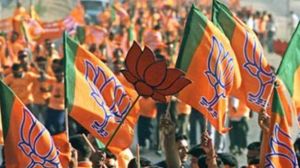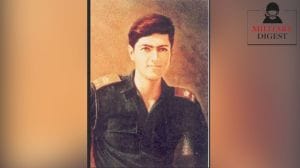Grain of truth
Open those windows of opportunityOn a seminar lecture tour in the US, I land up close to the Shenandoah. The US is like India, a large co...

Open those windows of opportunity
On a seminar lecture tour in the US, I land up close to the Shenandoah. The US is like India, a large country endowed with great natural beauty.
Thirty-two years ago I had just passed my doctoral prelims, perhaps the toughest academic exam in the world, for the Americans don8217;t put much store in the thesis and after the prelims you are a licensed academic, licensed as it is to kill in any seminar, classroom or journal. My room mate at Wharton decided that, since I had passed in the first go, I was to be rewarded with a trek in the Appalachian trail in the Shenandoah. Off we went for a beautiful week. In those days America was much less populated and much less diverse. But in the log cabins in the hills, you met men who had left civilisation8217; behind. Some were hobos, others searching for some meaning in life. The flower people were yet to come. I learnt that toleration, perhaps respect for the other8217;, was the heart of a democracy.
America, America. They were atit again, these two weeks that I was there. This time they were deconstructing Windows and Gates. One of the most important technologies of the last quarter of the millennium; the richest man in the world. It was all in the melting pot. The government8217;s anti-trust chief, Joel I. Klein of the Justice Department, and 19 state attorneys general over 76 gruelling days of testimony tried to convince US District Judge Thomas Penfield Jackson that Microsoft had bullied rivals and smothered innovation. Then this month the learned judge in the main agreed with them by a very highly critical 8220;findings of facts.8221;
Windows and its own access to the Inter-net was the motif of the last quarter of the millennium. It was at the centre of the technology, which changed the course of economic civilisation. My friend Michael Piore at MIT described the period as the neo-Fordist era. The Ford T. Model was the symbol of the factory era, of specialisation, of economies of scale and large size. The new technology wasuser-friendly, cut across innovations like the new materials, communications, cybernetics and networking. Above all it was for the small man 8212; the artisan and the lone ranger. Piore and his collaborators discovered 8220;industrial districts8221; in which old inherited skills were linking with regional and global markets. The new game was flexible specialisation. Ricardo Petrella of the EEC, who asked me to start a technology network in South Asia, called the new technology 8220;self destructive8221;, with short product cycles, leading to newer products building on the corpses of earlier efforts. Some like me argued that there was now a different perspective of possibilities to Gandhi8217;s vision of India.
Everybody saw the need of a new era of public policy. Help those who help themselves. Don8217;t think you have all the answers.
This was the level at which the anti-trust case was having its thrusts and parries. The main arguments of the critics were that by linking Windows with networking software, new technologies werestifled. The first few days saw all kinds of suggestions. In the Washing-ton Post, it was Rajiv Chandrasekaran, probably an American correspondent of Indian origin, who wrote extensively on the issue. Timothy F. Bresnan, the chief economist of Justice Department8217;s anti-trust division, compared the legal case to a dog chasing a truck. What do you do when you catch the truck? Three alternatives were discussed. The first was that Windows would be broken up into two or more companies. The second was that the Windows source code is shared. The third was that Microsoft would give up practices found to be monopolistic. Apart from the radical nature of the suggestions, there was an air of impracticality about them.
A solution of sorts has been found. The judge has apparently proposed that an independent anti-trust attorney, Richard A. Posner, who is apparently acceptable to all concerned, will find a negotiated settlement. Posner is described as conservative, close to Chicago economists with an open mind onanti-trust issues.
Meanwhile events have already had their impact. At the November 15 Comdex8217; Computer Dealer Expo in Las Vegas, Bill Gates enthralled an audience of two lakhs. He referred to entrepreneurs working in their garages and lawyers in their twentieth floor offices. Both groups are working to do what they do best, he said sarcastically. But the issues are now wide open.
On November 18, Comdex saw Linus Torvalds, the Finn who started Linux, the real competitor to Windows. Like Gates, Torvalds is a cult figure in the hi-tech world. But unlike the Windows8217; supertech vision, the Linux view comes out very American of Finnish origin. Torvalds says the price and convenience are the driving factors and promises to help you where you are.
These issues should interest us. It is good to produce software companies and experts, who have made it in NASDAQ. We are reaping the benefits of the vision of the leaders of the freedom movement who saw technology and training as the heart of freedom. But what aboutthe future? When the Prime Minister8217;s task force was set up, it was understandable that lots of people would want their projects to be funded by the state. But by now, we know that the money is not there for this mode of work in this field. No one knows how a new ministry8217; in this field would help. There is a view that the first round of explosion in software companies occurred because the government did not have a policy and the investments in knowledge had been made earlier. We don8217;t seem to be relying on the problem solvers for policies.
- 01
- 02
- 03
- 04
- 05































